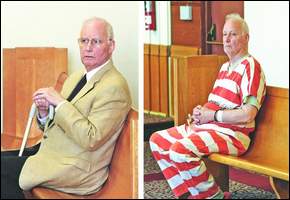http://www.californianonline.com/apps/pbcs.dll/article?AID=/20070303/NEWS01/703030317 Article published Mar 3, 2007
The judges concluded that if prospective jurors saw them on TV in jail threads, they might be left with impressions of guilt. Monterey County Superior Court Judge Russell Scott applied the same logic Wednesday when he broke with tradition in the county court system, ruling that Carmel Valley double-murder defendant Jack Kenney can wear street clothes at his pretrial hearings, which so far have attracted hordes of news photographers for both print and video. Kenney, 72, is accused of fatally shooting his Carmel Valley neighbors - well-respected criminal defense attorney Melvin Grimes, 58, and his wife, Elizabeth Grimes, 55 - on Jan. 30, over a property dispute. Kenney has pleaded not guilty to two charges of murder. He was allowed to wear street clothing at his latest two hearings. Under existing jail and court policies, inmates can wear their own clothing in front of a jury, but must wear jail-issued clothing at all pretrial hearings. Although Scott's ruling does not bind other county judges to follow suit, it will likely influence future rulings, since lawyers can now point to the Kenney decision and argue that the same courtesy should be granted to their clients. Scott is the presiding judge for the county court system. Security concerns
The Monterey County Sheriff's Office has objected to Kenney's request. During a hearing over the motion in February, Cmdr. Pat Hunton said it's bad policy to allow defendants in jail custody to wear their own clothing. For one thing, Hunton said, it could cause a logjam at the courthouse, because defendants would need supervision and time while changing before entering court. Further, she said, it raises security concerns because it's easier to introduce contraband such as weapons and drugs through street clothing than jail jumpsuits. "The established policy is only during a jury trial," Hunton said in court. "We have 51 people in custody for murder or attempted murder." But Salinas-based attorney Thomas Worthington, who's represented a bevy of high-profile defendants over the years, said he's hoping the bench adopts the shift. Worthington said allowing the public to see a defendant in his or her striped, jail-issued jumpsuit, whether before or during trial, is harmful to the defense. "It gives an impression that they must be guilty," Worthington said. "No matter what a court says, that picture is in the jury's mind. First impressions are something you can't erase." 'Lasting impression of guilt'
The latest example is the case of Martha Mata Vasquez, who made headlines and topped TV news reports last year when accused of killing a woman by injecting cooking oil into her buttocks during a supposed beauty treatment. Vasquez ultimately pleaded no contest to involuntary manslaughter charges. Superior Court Judge Terrance Duncan denied his motion for Vasquez to wear civilian clothing based on concerns it would set an informal precedent in the local court system, Worthington said. Scott cited similar concerns before ultimately granting Kenney's motion. At first, Salinas-based defense attorney Miguel Hernandez balked at the notion of Kenney being treated differently than previous defendants. "My original reaction was that this was baloney," Hernandez said. "You can't give this guy preferential treatment." But Hernandez, who was good friends with Melvin Grimes, said he changed his opinion when he read into defense attorney Dennis Lempert's argument. "If this guy is going to get any chance of a fair trial in this county, he can't be photographed or videotaped in garbs," he said. "It leaves a lasting impression of guilt." Could create precedent
But, he said, he's optimistic that Scott's decision could change their answers in the future. "I think it will create precedent," Hernandez said. Defendants in run-of-the-mill cases who ask to wear street clothing will still likely not be considered, he said, but any cases that might attract media interest, such as the Kenney case, stand a better chance now. "Other attorneys will pick up on this," Hernandez said. Barry Melton, president of the California Public Defenders Association, applauded Russell's ruling. "First of all, especially in a small county, you want to be sure you are not unduly influencing the prospective jury pool," said Melton, who's also public defender in Yolo County in Northern California. Melton said a 1981 U.S. Supreme Court ruling extends a defendant's right to wear civilian clothing at trial to pretrial proceedings. "People do this," he said, "because it could unfairly taint the jury to see the person in jail clothing. It's in everyone's interest - taxpayers, attorneys, the county and the courts - to make sure that any prejudice against a defendant is minimized." If not, Melton said, the defendant could have grounds for a mistrial or a costly motion for a change in venue. Common practice in California
Uelmen, law professor at Santa Clara University and executive director of the California Commission on the Fair Administration of Justice, said he was surprised to hear this was the first time a defendant has been allowed to wear street clothing before a trial in Monterey County. "It's simply recognized that prejudice can be more pervasive in a high-profile
case," he said. "The impression you form is strongly affected by their
attire, especially someone who is already in a jumpsuit and chains. It's
human response."
|
